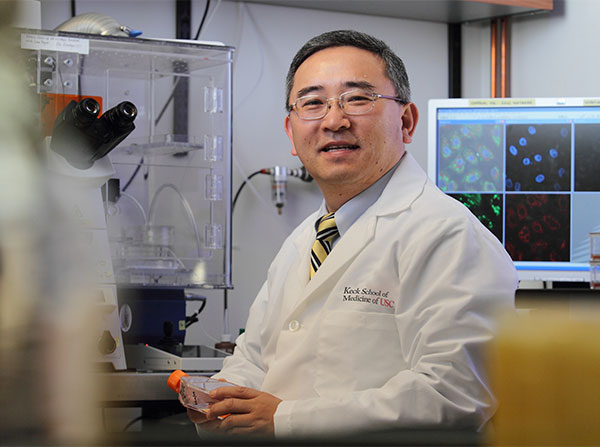
Distinguished Professor Jae Jung, PhD, is among this year’s recipients of the National Cancer Institute (NCI) Outstanding Investigator Award.
Jae Jung Lab in the Department of Molecular Microbiology and Immunology to receive over $7 million to investigate the development and prevention of Kaposi’s sarcoma.
Distinguished Professor Jae Jung, PhD, chair of the Department of Molecular Microbiology & Immunology and the director of the University of Southern California (USC) Institute for Emerging Pathogens and Immune Diseases at the Keck School of Medicine of USC, is among this year’s recipients of the National Cancer Institute (NCI) Outstanding Investigator Award.
Jung committed much of his last 20 years of research to examining viruses that stay dormant in the body for an entire lifetime and cause diseases upon declining immune conditions, with a particular emphasis on the Kaposi’s sarcoma associated herpesvirus (KSHV). At the time KSHV was discovered in 1994, a considerable number of people diagnosed with human immunodeficiency virus (HIV) developed Kaposi’s sarcoma. Jung was among the first scientists to research the virus.
“We are investigating how the virus persists in the body, how the virus induces Kaposi’s sarcoma and, ultimately, what we can do to prevent Kaposi’s sarcoma,” Jung said.
Kaposi’s sarcoma is a form of systemic cancer with cutaneous lesions that can be solitary, localized or disseminated. The disease is an AIDS-defining illness, though not all who are inflicted with Kaposi’s sarcoma are HIV positive. KSHV evades healthy immune systems for many years. When the immune system is weakened, either through HIV infection or organ transplant, KSHV can spread and cause significant damage.
To support Jung’s efforts, the NCI will provide an annual grant of $1 million for the next seven years, totaling $7 million for the Jae Jung Lab in the Department of Molecular Microbiology and Immunology.
“I am honored to be recognized as an Outstanding Investigator by the NCI,” Jung said. “But more importantly, I am excited for the opportunity, with the financial support of the NCI, to heavily focus on bigger questions about Kaposi’s sarcoma and lifelong, persistent infections of KSHV. I am very much looking forward to our discoveries over the next few years.”
“Dr. Jung is a valued professor and researcher at the Keck School of Medicine who strives to make measurable contributions toward the fight against cancer,” said Carmen Puliafito, MD, MBA, dean of the Keck School of Medicine. “We are thrilled that he is being honored with this distinction and look forward to what his research will bring to light.”
The Outstanding Investigator Award is a new grant program developed by NCI in 2014 that will provide funding to investigators with outstanding records of productivity in cancer research to continue or embark upon new projects of unusual potential in cancer research over an extended period of seven years. The Award was developed to provide investigators with substantial time to break new ground or extend previous discoveries to advance biomedical, behavioral, or clinical cancer research.
“The NCI Outstanding Investigator Award addresses a problem that many cancer researchers experience: finding a balance between focusing on their science while ensuring that they will have funds to continue their research in the future,” said Dinah Singer, PhD, director of NCI’s Division of Cancer Biology. “With seven years of uninterrupted funding, NCI is providing investigators the opportunity to fully develop exceptional and ambitious cancer research programs.”
NCI anticipates funding approximately 60 award recipients from the first round of applications submitted in 2015. Recipients are cancer researchers, nominated by their institutions, who have served as a principal investigator on an NCI grant for the last five years and have demonstrated outstanding cancer research productivity.
by Mary Dacuma